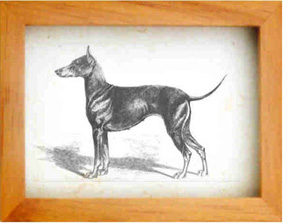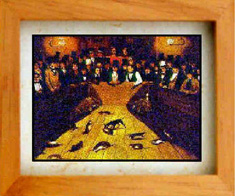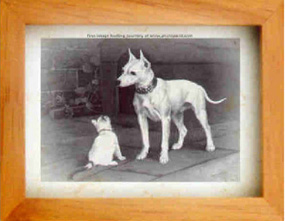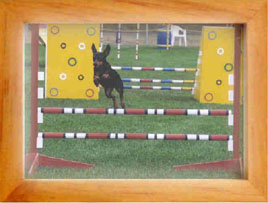

History:
 Appearing in the form we know today in the
late 1800s the longevity of this breed should be recognized. Writings referring
to an earlier version of the breed (the English Black and Tan Terrier) date back
almost 400 years, making the Manchester one of the oldest breeds of terrier
currently recognized by the Canadian Kennel Club.
Appearing in the form we know today in the
late 1800s the longevity of this breed should be recognized. Writings referring
to an earlier version of the breed (the English Black and Tan Terrier) date back
almost 400 years, making the Manchester one of the oldest breeds of terrier
currently recognized by the Canadian Kennel Club.
Originally bred as a "ratting
machine" Manchester's made frequent and highly acclaimed appearances in the
rat pits. One Manchester  named Billy is still lauded for his accomplishments,
having in 1827 killed 100 rats in only 12 minutes! It was during the mid-1900s
that smaller versions of the Black and Tan began to appear due to a trend toward
miniaturization. Not to be outdone at least one of these smaller versions, a
five pounder appropriately named "Tiny," is known to have killed 100
rats in the astonishing time of 5 1/2 minutes!
named Billy is still lauded for his accomplishments,
having in 1827 killed 100 rats in only 12 minutes! It was during the mid-1900s
that smaller versions of the Black and Tan began to appear due to a trend toward
miniaturization. Not to be outdone at least one of these smaller versions, a
five pounder appropriately named "Tiny," is known to have killed 100
rats in the astonishing time of 5 1/2 minutes!
During the late 19th century the
popularity of the breed fell with the outlawing of blood sports and the banning
of ear cropping.  It was at this point that several devoted breeders began to
reform the breed. By using a Whippet cross they were able to transform the breed
from the rough coated, rugged terrier of the ratters to the sleek, elegant,
gentleman's companion we now know. The Manchester now appears as two varieties
in North America, distinguished primarily by weight: Toys up to, but not
exceeding 12 lb., and Standards 12-22 lb.
It was at this point that several devoted breeders began to
reform the breed. By using a Whippet cross they were able to transform the breed
from the rough coated, rugged terrier of the ratters to the sleek, elegant,
gentleman's companion we now know. The Manchester now appears as two varieties
in North America, distinguished primarily by weight: Toys up to, but not
exceeding 12 lb., and Standards 12-22 lb.
Today the Manchester is at its best
cuddled up on a lap or laying in the sun, but is equally at home in more
athletic situations.  The versatility of the breed knows no bounds as their
mischeviousness and overall gaminess find new ways to express themselves.
Manchester's are constantly invading new territory in the dog world as they make
their mark in conformation and obedience rings as well as flyball and agility
trials across the country. Several have also made in-roads as Therapy dogs.
The versatility of the breed knows no bounds as their
mischeviousness and overall gaminess find new ways to express themselves.
Manchester's are constantly invading new territory in the dog world as they make
their mark in conformation and obedience rings as well as flyball and agility
trials across the country. Several have also made in-roads as Therapy dogs.
![]()
Temperament:
The Manchester is best described as a loyal,affectionate and devoted companion. Neither shy nor aggressive, the Manchester is observant, alert and discerning with strangers yet generally friendly with other breeds. Most Manchesters are equally as comfortable spending a day lounging in bed (preferrably under the covers) as they are in more athletic pursuits, making them an ideal house pet. Generally Manchesters are not well-suited to kennel life nor are they physically prepared for extended periods outdoors in inclement weather. More information on the breed's temperament traits can be found on the FAQ page.
![]()
![]() Main Page
Main Page ![]() About the CMTC
About the CMTC ![]() About MTs
About MTs ![]() Special Features
Special Features ![]() Health Info
Health Info ![]()
![]() Breed
Links
Breed
Links ![]() Manchester Photos
Manchester Photos ![]() Newsletter
Newsletter ![]() Club Contacts
Club Contacts ![]()
![]() Club
Committees
Club
Committees ![]() Join the CMTC
Join the CMTC ![]()